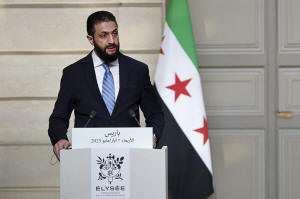Syria's leader says his country is holding indirect talks with Israel to
avert an escalation
[May 08, 2025]
By BASSEM MROUE and ANGELA CHARLTON
PARIS (AP) — Syrian President Ahmad al-Sharaa said Wednesday that his
country is holding indirect talks with Israel to prevent recent
hostilities from getting out of control. He spoke on his first visit to
Europe since taking office in January, and as he seeks to broaden ties
to Western countries.
Israel carried out a series of airstrikes on parts of Syria last week,
saying it aims to protect the country’s Druze minority from coming under
attack by pro-government gunmen.
Speaking to reporters in Paris, al-Sharaa said, ″Regarding negotiations
with Israel, there are indirect talks through mediators to calm down the
situation so that they don’t get out of control.″ He did not say who the
mediators are.
There was no immediate public comment from Israel. Israel has its own
Druze community and officials have said they would protect the Druze of
Syria and warned Islamic militant groups from entering predominantly
Druze areas.
Al-Sharaa met earlier Wednesday with French President Emmanuel Macron,
who said he would push the EU and U.S. to lift sanctions on Syria to
boost its economy. Macron also called for continued U.S. and
international military presence in Syria to fight terrorist groups
threatening security in the Mideast and Europe.
Al-Sharaa took power after his Islamist group, Hayat Tahrir al-Sham (HTS),
led an offensive that toppled former President Bashar Assad in December.
Assad, a member of Syria’s Alawite minority, ruled for more than two
decades.

The Syrian leader's visit to Paris comes a week after clashes between
forces loyal to al-Sharaa and fighters from the minority Druze sect that
left nearly 100 people dead. This followed earlier violence in Syria’s
coastal region between Sunni gunmen and members of the minority Alawite
sect, which left more than 1,000 people dead, many of them Alawite
civilians killed in revenge attacks.
Religious minorities in Syria, including Alawites, Christians and Druze,
fear persecution under the predominantly Sunni Muslim-led government.
Al-Sharaa has repeatedly pledged that all Syrians will be treated
equally regardless of religion or ethnicity.
The 14-year conflict has killed nearly half a million people and
displaced millions. Syria’s infrastructure lies in ruins, and
international sanctions remain a major barrier to reconstruction.
The visit to Paris is being closely watched as a potential test of
Europe’s willingness to engage with Syria’s new leadership.
[to top of second column]
|

Syria's interim President Ahmad al-Sharaa, speaks during a joint
press conference with French President Emmanuel Macron after a
meeting at the Elysee Palace in Paris, Wednesday, May 7, 2025.
(Stephanie Lecocq/Pool via AP)

The European Union has begun easing sanctions, suspending measures
targeting Syria’s oil, gas and electricity sectors, as well as
transport, including aviation, and banking restrictions. The EU said
that it would monitor developments in Syria to see whether other
economic sanctions could be lifted, but its 27 member states are
divided on whether to go further.
In late April, the British government announced it was lifting
sanctions on a dozen Syrian entities, including government
departments and state-run media outlets.
The administration of U.S. President Donald Trump has yet to
formally recognize the new Syrian government led by al-Sharaa, and
HTS remains a U.S.-designated terrorist organization. Sanctions
imposed on Damascus under Assad remain in place. However, Washington
eased some restrictions in January when the U.S. Treasury issued a
general license, valid for six months, authorizing certain
transactions with the Syrian government, including some energy sales
and incidental transfers.
One of France’s concerns after the collapse of the Assad regime is
the status of radicalized French nationals who left France to join
jihadist groups in Syria.
One is the fugitive widow of an Islamic State killer who plotted
deadly attacks against the Charlie Hebdo satirical newspaper and a
kosher market in Paris in 2015.
Around 120 French nationals who left to join groups in Syria are
also being held in Kurdish-run camps and prisons, France’s national
anti-terrorism prosecutor says. In all, about 1,500 French nationals
left for Syria to join extremist groups, and the whereabouts of
about 300 others are unknown, he has said.
___
Mroue reported from Beirut, Lebanon. John Leicester and Thomas
Adamson in Paris contributed.
All contents © copyright 2025 Associated Press. All rights reserved
 |